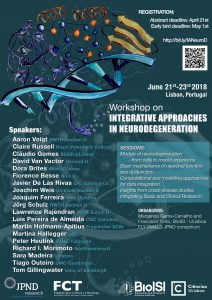The EU Joint Programme on Neurodegenerative Disease Research (JPND) is inviting proposals from multi-national research teams to increase understanding of the factors that contribute to the quality and delivery of health and social care for neurodegenerative diseases.
Current research suggests strong potential for improving quality of life for those living with neurodegenerative diseases such as Alzheimer’s disease and Parkinson’s disease, with novel health and social care concepts and innovations focusing on the preservation of dignity, independence and social inclusion. Nevertheless, the availability and quality of such services vary considerably across Europe and beyond.
In this context, JPND today announced a new call inviting multi-national research teams to submit proposals for ambitious, innovative and multi-disciplinary collaborative projects that address health and social care at both the macro level of systems and infrastructures and the individual level of patients, carers and families.

Professor Philippe Amouyel, Chair of JPND
“Over the past decades, most of the funding has been allocated to basic and translational research with the aim of discovering new treatments,” said Professor Philippe Amouyel, Chair of JPND. “However, immediate impactful developments also come from health and social care research and innovation, including new insights that point to the potential for improved patient empowerment, civic participation, and quality of life. That’s why twenty JPND countries have earmarked €21 million to support multi-national research consortia investigating the strengths and weaknesses of different models of care and potential pathways to implementing improved, evidence-based approaches. Our hope is that this work will lead to the adoption of novel health promotion strategies that will reduce the impact of disease for patients as well as for their families and carers.”
Proposals submitted under this call, which is open to applicants in 20 countries, must relate to any or several of the following neurodegenerative diseases: Alzheimer’s disease and other dementias, Parkinson’s disease and related disorders, prion diseases, motor neuron diseases, Huntington’s disease, spinocerebellar ataxia and spinal muscular atrophy. JPND is committed to Patient and Public Involvement, and proposals are expected to engage patients, carers and the public. Research projects may include, but are not limited to, one or several of the following areas:
- Care pathways and programmes using the potential of patient involvement
- Factors influencing progression and prognosis of disease
- Outcome measures for patients and their informal carers
- Palliative care for patients
- Cost-effectiveness and affordability of interventions including ethical concerns
Pre-proposals must be submitted no later than 23:59h C.E.T. on March 6, 2018.
For more information about the call, please click here.
The EU Joint Programme on Neurodegenerative Disease Research (JPND) was established to better coordinate research efforts across countries and disciplines to more rapidly find causes, develop cures and identify better ways to care for people with neurodegenerative disease. Today more than 40 million people worldwide are estimated to be living with Alzheimer’s disease and related disorders – the most common class of neurodegenerative disease – and this figure is expected to rise in the coming decades. The JPND Research and Innovation Strategy identified research priorities and provided a framework for future investment and is available for download here.


